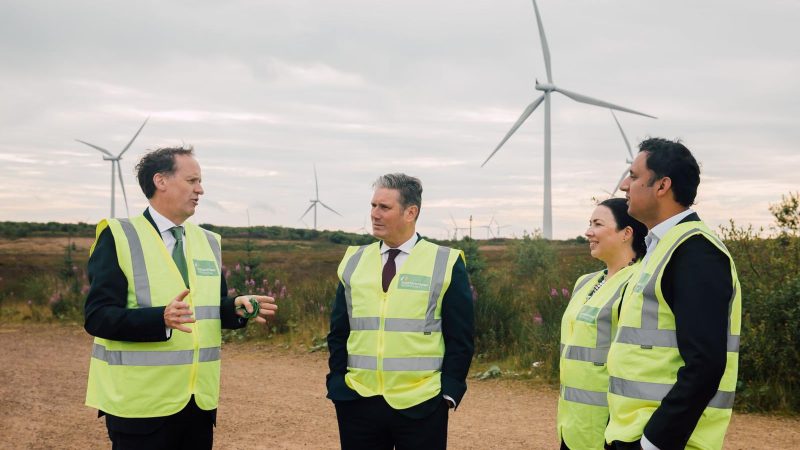
Labour’s green prosperity plan (GPP) has the potential to help confront the major crises of our time: the escalating climate emergency and ingrained economic inequality. It is urgently needed. With the UK lagging on its own climate targets and struggling to keep up with international competitors in efforts to scale green industries, it looks ever clearer that — at least so far — private sector and market-led approaches to transition investment have proven insufficient to the task. However, to fully realise its potential to address these weaknesses and drive decarbonisation and nurture shared prosperity, Labour’s plan must prioritise not just new money, but the creation of robust and accountable institutions for public investment and democratic coordination.
The reason is structural: meeting net zero is an investment and divestment problem. Relying solely on market coordination driven by private investment and profitability to deliver both these outcomes offers little hope for delivering the necessary changes to productive systems and the composition of demand aligned with our climate targets while ensuring a stable and managed transition. Market coordination is malcoordination, leading to issues of underinvestment, unmanaged divestment, inflation, unemployment, wealth concentration, and a deficit of accountability. A comprehensive transformation of our fossil-based economy requires a major shift in our patterns of consumption, economic decision-making, and enterprise structures.
Democratic coordination of the transition, facilitated by institutions of public investment, asset ownership, and inclusive and pluralist decision-making, offers a more effective pathway to deliver investment and democratise economic life. By building robust and accountable public institutions, Labour can ensure that the allocation of the green prosperity plan’s investment is effective towards its aims of driving decarbonisation and economic revitalisation. Critical sectors that require sustained and substantial intervention to decarbonise, such as clean energy, public transport, housing and heavy industry, can benefit from the strategic investment, oversight and coordination that accountable public institutions can provide.
Governments around the world, like the Biden Administration with its Inflation Reduction Act (IRA), have recognised the limits of market-led approaches and turned towards state-led green industrial strategies. The green prosperity plan, with its significant investment plan and economic strategy for moving to net zero and scaling green industries, should prioritise the establishment of accountable, robust institutions for public investment and democratic coordination. This can ensure that as investment is ramped up over the 2020s that spending maximises public benefit. Labour can learn from the early stages of implementing the IRA and ensure that coordination problems are effectively addressed from the outset.
Labour’s already committed to creating two such institutions of democratic coordination: Great British Energy (GBE) and the national wealth fund. GBE would be a publicly owned renewable electricity generation company to lead the investment sprint necessary to decarbonise the UK power sector and alleviate the cost-of-living crisis. The next step is to fight for a maximal vision of GBE, while extending the arguments of public ownership out to bring grid planning under public control and begin the movement toward a genuine energy democracy.
Second, the national wealth fund, announced at party conference last year, can strategically invest in industrial decarbonisation and scaling up key green sectors. By coordinating public and private investment with green and democratic aims, the NWF can serve as a central institution for coordinating the transition.
But, further institutions are necessary to coordinate the green prosperity plan. A National Green Housing Authority (NGHA), for example to lead the decarbonisation and decommodification of household energy efficiency. With housing being a devolved function, each nation in the UK should establish its own NGHA to tailor interventions to local needs. For transport, a National Green Transit Authority should be established to coordinate the buildout of a broad and comprehensive green transport system, which is crucial for both reaching net zero and the future of our manufacturing economy.
A Green Economic Development Council should be established as the centrepiece of the coordination strategy, setting national and sectoral pathways for decarbonising the economy, managing implementation, and ensuring macroeconomic and macrofinancial stability are baked into transition plans.
Finally, Labour’s commitment to democratic principles should extend to the transformation of companies to facilitate greater worker and community-led coordination of the transition. Through measures such as sectoral collective bargaining, worker representation, profit-sharing, green veto powers in company decision making and public ownership, the green prosperity plan can foster an inclusive green future. Empowering workers and diverse stakeholders to participate in decision-making processes will drive forward investment, innovation and ensure a just transition up and down the country.
Through the right mix of democratic coordination institutions, Labour’s transition plans can spur a shift to a sustainable future based on high-quality, unionised green jobs, new patterns of consumption and energy democracy. This ambitious and comprehensive approach can address climate emergency, while alleviating the energy price crisis and rebalancing the economy in the interests of the majority.



More from LabourList
2024 local election results: Live updates on key races for Labour as counts begin
Ian Murray: ‘John Swinney offers nothing new – Scotland can send a government to Westminster, not just a message’
Local elections 2024: Live polling day updates as activists urged to give mayor candidates final push